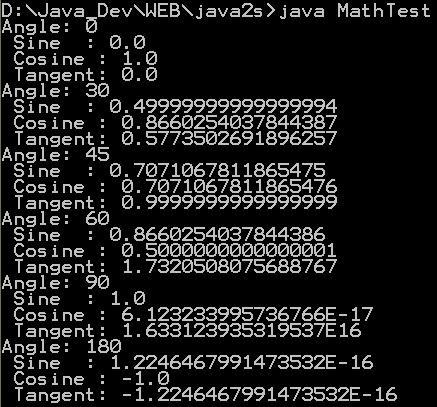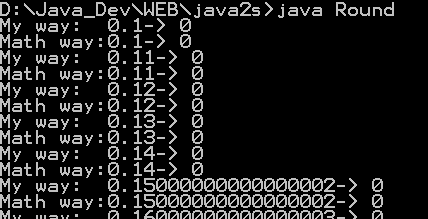Least Common Multiple (LCM) of two strictly positive integer numbers
/*
* $RCSfile: MathUtil.java,v $
* $Revision: 1.1 $
* $Date: 2005/02/11 05:02:25 $
* $State: Exp $
*
* Class: MathUtil
*
* Description: Utility mathematical methods
*
*
*
* COPYRIGHT:
*
* This software module was originally developed by Raphal Grosbois and
* Diego Santa Cruz (Swiss Federal Institute of Technology-EPFL); Joel
* Askelf (Ericsson Radio Systems AB); and Bertrand Berthelot, David
* Bouchard, Flix Henry, Gerard Mozelle and Patrice Onno (Canon Research
* Centre France S.A) in the course of development of the JPEG2000
* standard as specified by ISO/IEC 15444 (JPEG 2000 Standard). This
* software module is an implementation of a part of the JPEG 2000
* Standard. Swiss Federal Institute of Technology-EPFL, Ericsson Radio
* Systems AB and Canon Research Centre France S.A (collectively JJ2000
* Partners) agree not to assert against ISO/IEC and users of the JPEG
* 2000 Standard (Users) any of their rights under the copyright, not
* including other intellectual property rights, for this software module
* with respect to the usage by ISO/IEC and Users of this software module
* or modifications thereof for use in hardware or software products
* claiming conformance to the JPEG 2000 Standard. Those intending to use
* this software module in hardware or software products are advised that
* their use may infringe existing patents. The original developers of
* this software module, JJ2000 Partners and ISO/IEC assume no liability
* for use of this software module or modifications thereof. No license
* or right to this software module is granted for non JPEG 2000 Standard
* conforming products. JJ2000 Partners have full right to use this
* software module for his/her own purpose, assign or donate this
* software module to any third party and to inhibit third parties from
* using this software module for non JPEG 2000 Standard conforming
* products. This copyright notice must be included in all copies or
* derivative works of this software module.
*
* Copyright (c) 1999/2000 JJ2000 Partners.
* */
/**
* This class contains a collection of utility methods fro mathematical
* operations. All methods are static.
* */
public class MathUtil {
/**
* Method that calculates the Least Common Multiple (LCM) of two strictly
* positive integer numbers.
*
* @param x1 First number
*
* @param x2 Second number
* */
public static final int lcm(int x1,int x2) {
if(x1<=0 || x2<=0) {
throw new IllegalArgumentException("Cannot compute the least "+
"common multiple of two "+
"numbers if one, at least,"+
"is negative.");
}
int max,min;
if (x1>x2) {
max = x1;
min = x2;
} else {
max = x2;
min = x1;
}
for(int i=1; i<=min; i++) {
if( (max*i)%min == 0 ) {
return i*max;
}
}
throw new Error("Cannot find the least common multiple of numbers "+
x1+" and "+x2);
}
/**
* Method that calculates the Least Common Multiple (LCM) of several
* positive integer numbers.
*
* @param x Array containing the numbers.
* */
public static final int lcm(int[] x) {
if(x.length<2) {
throw new Error("Do not use this method if there are less than"+
" two numbers.");
}
int tmp = lcm(x[x.length-1],x[x.length-2]);
for(int i=x.length-3; i>=0; i--) {
if(x[i]<=0) {
throw new IllegalArgumentException("Cannot compute the least "+
"common multiple of "+
"several numbers where "+
"one, at least,"+
"is negative.");
}
tmp = lcm(tmp,x[i]);
}
return tmp;
}
}
Related examples in the same category
| 1. | Absolute value | | |
| 2. | Find absolute value of float, int, double and long using Math.abs | | |
| 3. | Find ceiling value of a number using Math.ceil | | |
| 4. | Find exponential value of a number using Math.exp | | |
| 5. | Find floor value of a number using Math.floor | | |
| 6. | Find minimum of two numbers using Math.min | | |
| 7. | Find power using Math.pow | | |
| 8. | Find square root of a number using Math.sqrt | | |
| 9. | Find natural logarithm value of a number using Math.log | | |
| 10. | Find maximum of two numbers using Math.max | | |
| 11. | Get the power value | |  |
| 12. | Using the Math Trig Methods | |  |
| 13. | Using BigDecimal for Precision | |  |
| 14. | Demonstrate our own version round() | |  |
| 15. | Demonstrate a few of the Math functions for Trigonometry | |  |
| 16. | Exponential Demo | |  |
| 17. | Min Demo | | |
| 18. | Basic Math Demo | |  |
| 19. | Using strict math in applications | |  |
| 20. | Conversion between polar and rectangular coordinates | | |
| 21. | Using the pow() function | | |
| 22. | Using strict math at the method level | | |
| 23. | Calculating hyperbolic functions | | |
| 24. | Calculating trigonometric functions | | |
| 25. | Weighted floating-point comparisons | | |
| 26. | Solving right triangles | | |
| 27. | Applying the quadratic formula | | |
| 28. | Calculate the floor of the log, base 2 | | |
| 29. | Greatest Common Divisor (GCD) of positive integer numbers | | |
| 30. | Moving Average | | |
| 31. | Make Exponention | | |
| 32. | Caclulate the factorial of N | | |
| 33. | Trigonometric Demo | |  |
| 34. | Complex Number Demo | | |
| 35. | sqrt(a^2 + b^2) without under/overflow | | |
| 36. | Returns an integer hash code representing the given double array value. | | |
| 37. | Returns an integer hash code representing the given double value. | | |
| 38. | Returns n!. Shorthand for n Factorial, the product of the numbers 1,...,n as a double. | | |
| 39. | Returns n!. Shorthand for n Factorial, the product of the numbers 1,...,n. | | |
| 40. | Returns the hyperbolic sine of x. | | |
| 41. | Contains static definition for matrix math methods. | | |
| 42. | For a double precision value x, this method returns +1.0 if x >= 0 and -1.0 if x < 0. Returns NaN if x is NaN. | | |
| 43. | For a float value x, this method returns +1.0F if x >= 0 and -1.0F if x < 0. Returns NaN if x is NaN. | | |
| 44. | Normalize an angle in a 2&pi wide interval around a center value. | | |
| 45. | Normalizes an angle to a relative angle. | | |
| 46. | Normalizes an angle to an absolute angle | | |
| 47. | Normalizes an angle to be near an absolute angle | | |
| 48. | Returns the natural logarithm of n!. | | |
| 49. | Returns the least common multiple between two integer values. | | |
| 50. | Gets the greatest common divisor of the absolute value of two numbers | | |
| 51. | Matrix manipulation | | |
| 52. | Returns exact (http://mathworld.wolfram.com/BinomialCoefficient.html) Binomial Coefficient | | |
| 53. | Returns a double representation of the (http://mathworld.wolfram.com/BinomialCoefficient.html) Binomial Coefficient | | |
| 54. | Returns the natural log of the (http://mathworld.wolfram.com/BinomialCoefficient.html) Binomial Coefficient | | |
| 55. | Returns the hyperbolic cosine of x. | | |
| 56. | Math Utils | | |
| 57. | Implements the methods which are in the standard J2SE's Math class, but are not in in J2ME's. | | |
| 58. | Utility methods for mathematical problems. | | |
| 59. | A math utility class with static methods. | | |
| 60. | Computes the binomial coefficient "n over k" | | |
| 61. | Log Gamma | | |
| 62. | Log Beta | | |
| 63. | Beta | | |
| 64. | Gamma | | |
| 65. | Factorial | | |
| 66. | Computes p(x;n,p) where x~B(n,p) | | |
| 67. | Returns the sum of two doubles expressed in log space | | |
| 68. | sigmod | | |
| 69. | sigmod rev | | |
| 70. | Numbers that are closer than this are considered equal | | |
| 71. | Returns the KL divergence, K(p1 || p2). | | |
| 72. | Returns the sum of two doubles expressed in log space | | |
| 73. | Returns the difference of two doubles expressed in log space | | |
| 74. | Is Prime | | |
| 75. | Statistical functions on arrays of numbers, namely, the mean, variance, standard deviation, covariance, min and max | | |
| 76. | This class calculates the Factorial of a numbers passed into the program through command line arguments. | |  |
| 77. | Calculates the Greatest Common Divisor of two numbers passed into the program through command line arguments. | | |
| 78. | Variance: the square of the standard deviation. | | |
| 79. | Population Standard Deviation | | |
| 80. | Returns from a static prime table the least prime that is greater than or equal to a specified value. | | |